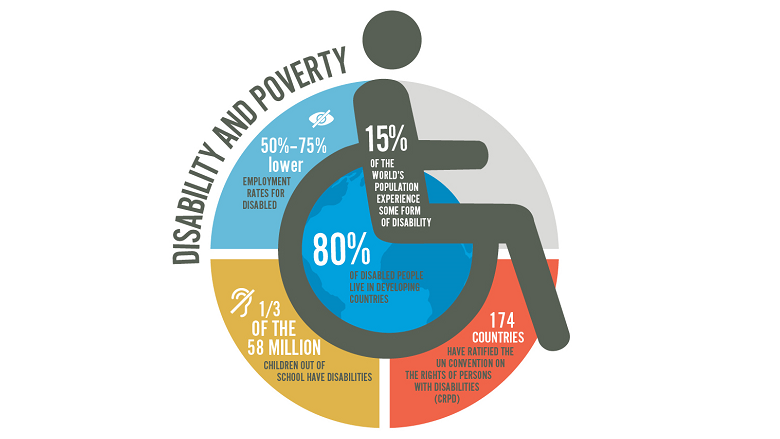LONDON, July 24, 2018 – Today at the World Disability Summit, hosted by the UK Department for International Development (DfID) in collaboration with the Government of Kenya and the International Disability Alliance, the World Bank Group (WBG) and other Summit participants announced 10 commitments to accelerate global efforts towards disability-inclusive development in key areas including education, digital development, data collection, gender, post-disaster recovery, transport, private sector investment, and social protection.
In line with the World Bank Group’s strategy to develop human capital around the world, the World Bank Group’s commitment on disability-inclusive development aims to help developing countries invest more and more effectively in people with disabilities and accessible services.
“It is time to listen to the one billion people living with disabilities around the world. They are an incredibly powerful group, but their potential is too often ignored,” said World Bank CEO Kristalina Georgieva. “Economic growth and poverty reduction depend on equal opportunities for all. Today, we are committed to doing more and doing better to ensure that people with disabilities have an equal chance to succeed.”
According to the World Disability Report by the World Bank and the World Health Organization, it is estimated that more than one billion people worldwide have some kind of disability, of which 800 million live in developing countries. People with disabilities face prejudice and discrimination, are excluded from access to jobs, education, health care and other services, and are consistently less able than people without disabilities in terms of development outcomes.
This commitment builds on the World Bank Group’s ongoing efforts to support the 2030 Agenda for Sustainable Development and respond to the urgent need to accelerate action at scale to achieve disability-inclusive development.
The 10 commitments include:
1) Ensure that all World Bank-funded education programs and projects are disability-inclusive by 2025.
2) Ensure that all World Bank-funded digital development projects are disability-inclusive, including through the adoption of universal design and accessibility standards.
3) Expand the collection and use of disability data, in line with global standards and best practices, such as the use of the Washington Group’s Short Questionnaire on Disability.
4) Introduce questions about disability into the Women, Business and the Law survey to better understand the economic empowerment of women with disabilities.
5) Ensure that all post-disaster public facility funding projects are disability-inclusive by 2020.
6) By 2025, ensure that all World Bank-financed urban transport and rail projects that support public transport services are disability-accessible.
7) Strengthening due diligence on private sector projects funded by the International Finance Corporation (IFC) regarding the inclusion of people with disabilities.
8) By 2025, ensure that 75 percent of World Bank-financed social protection projects are disability-inclusive.
9) Increase the number of WBG staff with disabilities.
10) Promote a Disability Inclusion and Accountability Framework among World Bank staff as a way of supporting the World Bank’s new Environmental and Social Framework (ESF).
For World Bank projects in particular, these commitments, combined with the ESF, which contains strong provisions to protect the interests of persons with disabilities in project-affected communities, will strengthen development opportunities and benefits for all.
This commitment builds on the World Bank’s work on disability inclusion over the past 15 years, including the first Conference on Disability and Inclusive Development in 2002, early funding for the Washington Group for Disability Statistics, and the groundbreaking World Report on Disability in 2011, in partnership with the World Health Organization.
Over the past five years, the World Bank has significantly strengthened its work on disability-inclusive development across multiple sectors, including fragility and conflict, education, social inclusion, transport, and water. For example:
The World Bank has pioneered demobilization and reintegration projects to support ex-combatants with disabilities in the Democratic Republic of the Congo, Rwanda, South Sudan, and Burundi. In Rwanda, for example, the World Bank supported accessible housing for ex-combatants with disabilities and provided income-generation support, including skills training, assistive devices, transportation, and cooperative formation, to more than 2,800 ex-combatants with disabilities. It also provided financial and knowledge support to India’s Sarva Shiksha Abhiyan (Education for All) program, which has helped 2.7 million children with disabilities attend mainstream schools. In Palestine, the World Bank supported the provision of social services to people with disabilities and their families in areas that were inaccessible to the Palestinian Authority, and microcredit and skills development for adults with disabilities and women with children with disabilities. In Indonesia, the World Bank is working with nearly 200 villages to build comprehensive water access and community sanitation infrastructure.
As part of its participation in today’s Summit, the World Bank Group, along with the UK Department for International Development (DfID) and other Summit participants, also signed the World Disability Summit 2018 – Transformation Charter, a global commitment that reflects and strengthens the World Bank Group’s commitment to disability-inclusive development.

